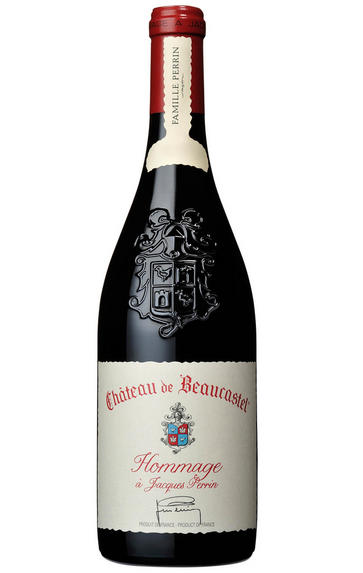
2010 Châteauneuf-du-Pape, Hommage à Jacques Perrin, Château de Beaucastel,Rhône
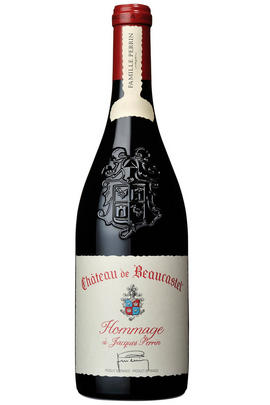
Critics reviews
Jeb Dunnuck - 28/02/2015
About this WINE
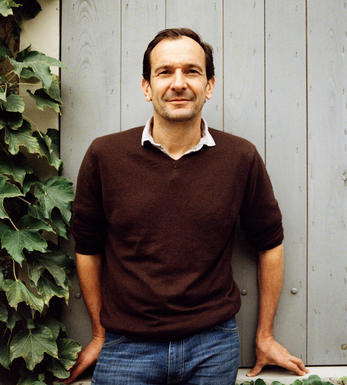
Chateau de Beaucastel
The Perrin family of Châteauneuf-du-Pape are one of the Rhône Valley’s greatest vineyard owners. With over 200 hectares of top level, prime vineyards at their fingertips, they have the terroir and skill required to produce some of the region’s finest wines.
The estate traces its history back to a plot of Coudoulet vines bought by Pierre de Beaucastel in 1549. The estate was transferred into the Perrin family in 1909 through marriage, where it remains firmly to this day. Despite being one of the old guards of the region, they are also one of the most progressive estates. They were one of the first converts to organic and biodynamic faming in Châteauneuf-du-Pape, which they adopted in 1950 and 1974 respectively.
César Perrin, winemaker at Beaucastel, is very happy with his 2021s. He tells of a cool and long growing season producing wines which are bright, fresh and lower in alcohol than has become the norm in recent years. Their Syrah vines were more heavily impacted by the Spring frosts, so a higher percentage of Mourvèdre - already signature of the Perrin’s style - went into the Beaucastel red than usual (40%, whereas the norm is nearer 30%). This helps bolster the dark fruit profile of the wine, as well as ensuring a balanced tannin structure.
We offered the Perrin’s full range of wines upon release in October last year, though we held back a small amount of their two flagship Château de Beaucastel wines so we could offer them to anyone who missed out.
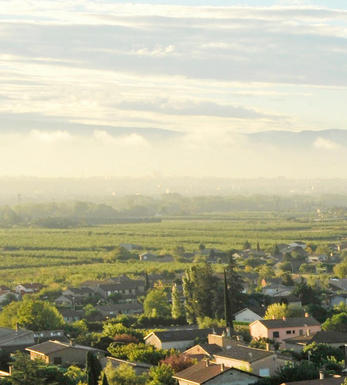
Châteauneuf-du-Pape
The most celebrated village of the Southern Rhône, Châteauneuf-du-Pape is the birthplace of the now indispensable French Appellation d’Origine Contrôlée system – imperfect though it may be. Compared to the Northern Rhône, the vineyards here are relatively flat and often feature the iconic galet pebbles – the precise benefits of which are a source of much debate. Minimum alcohol levels required by the AOC are the highest in France, but at 12.5% it is well below the natural generosity of Grenache, which only achieves its full aromatic potential when it is fully ripe and laden with the resultant high sugars. Syrah and Mourvèdre contribute the other defining elements in the blend, adding pepper, savoury spice and structure to the decadent Grenache. There are a further 10 permitted red grape varieties which can be used to adjust the “seasoning”. Of the five white varieties permitted, it is Grenache Noir’s sibling – predictably perhaps – Grenache Blanc, which dominates, though Roussanne shows a great deal of promise when handled well, notably at Château de Beaucastel.
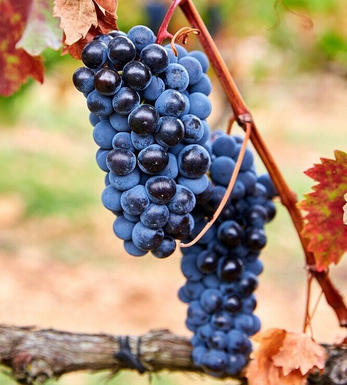
Southern Rhône Blend
The vast majority of wines from the Southern Rhône are blends. There are 5 main black varieties, although others are used and the most famous wine of the region, Châteauneuf du Pape, can be made from as many as 13 different varieties. Grenache is the most important grape in the southern Rhône - it contributes alcohol, warmth and gentle juicy fruit and is an ideal base wine in the blend. Plantings of Syrah in the southern Rhône have risen dramatically in the last decade and it is an increasingly important component in blends. It rarely attains the heights that it does in the North but adds colour, backbone, tannins and soft ripe fruit to the blend.
The much-maligned Carignan has been on the retreat recently but is still included in many blends - the best old vines can add colour, body and spicy fruits. Cinsault is also backtracking but, if yields are restricted, can produce moderately well-coloured wines adding pleasant-light fruit to red and rosé blends. Finally, Mourvèdre, a grape from Bandol on the Mediterranean coast, has recently become an increasingly significant component of Southern Rhône blends - it often struggles to ripen fully but can add acidity, ripe spicy berry fruits and hints of tobacco to blends.


Buying options
Add to wishlist
Description
Tight, dense and backward, the 2010 Chteauneuf du Pape Hommage Jacques Perrin was one of the least approachable wines in the lineup, yet certainly has incredible potential. Offering lots of liquid minerality, crushed rock, blueberry, truffle and cassis, its massive and concentrated on the palate, with building tannin, good acidity and a firm, focused feel that begs for cellaring. Hide these in the cellar for another decade.
Jeb Dunnuck - 28/02/2015
wine at a glance
Delivery and quality guarantee